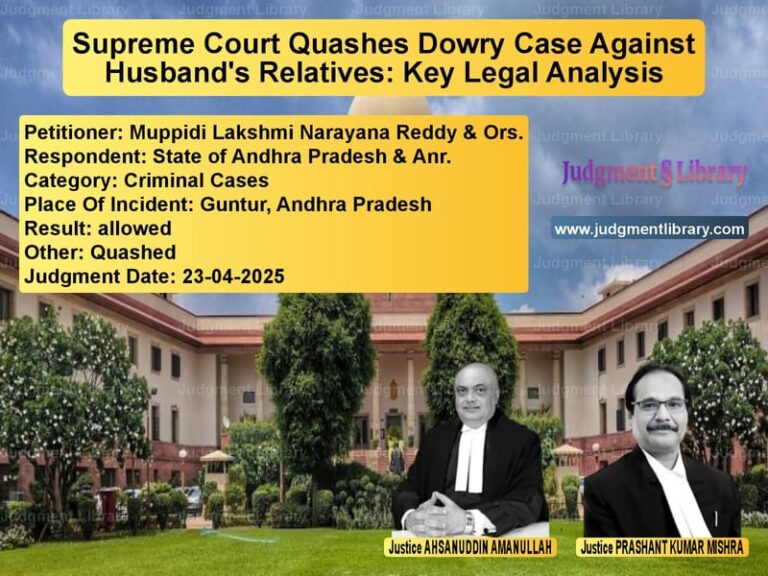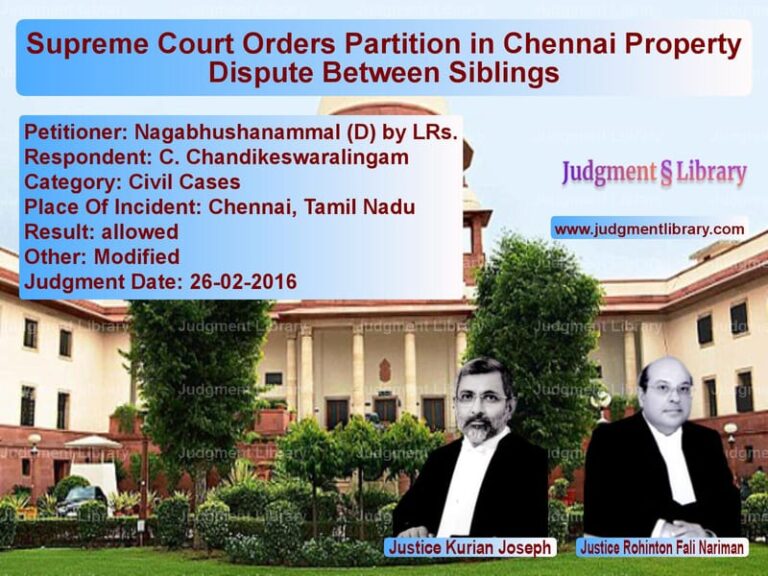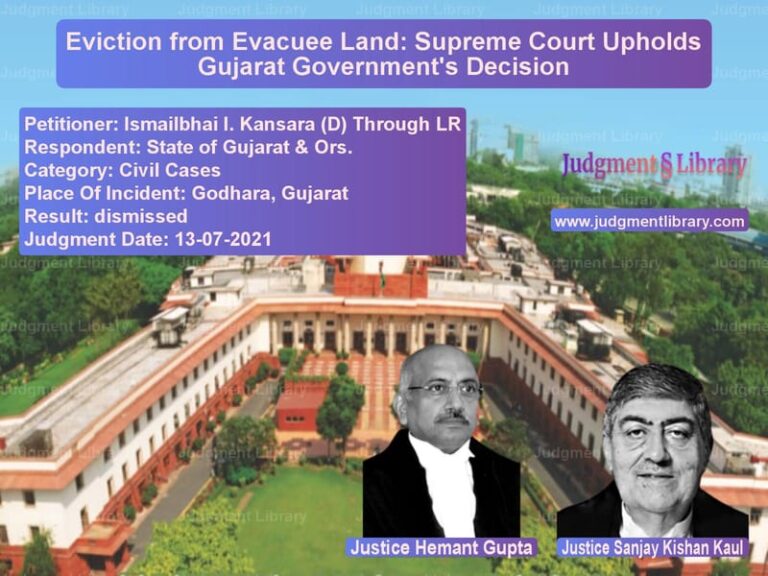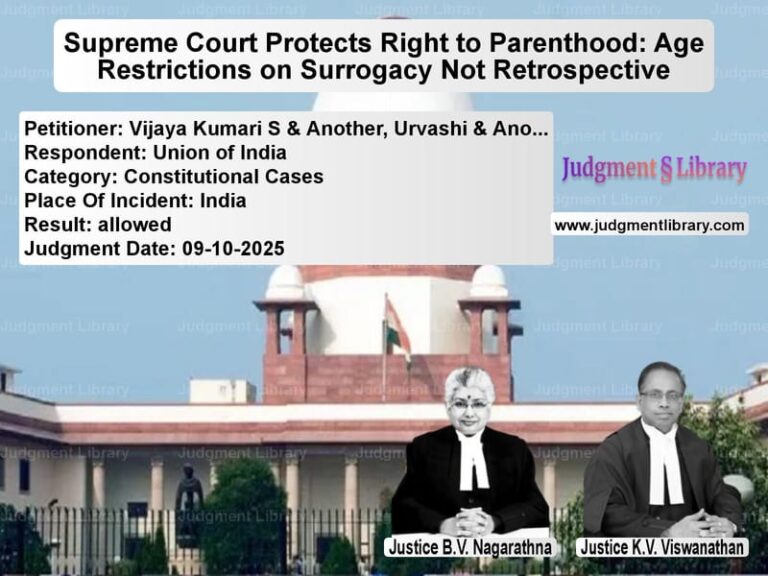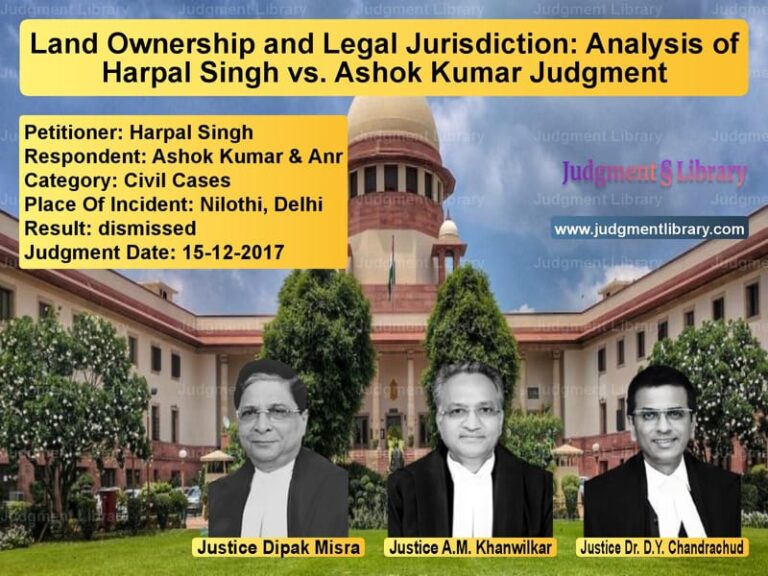HUF and Deemed Dividend: Supreme Court Clarifies Taxation Under Section 2(22)(e) of the Income Tax Act
The Supreme Court of India, in the case of Gopal and Sons (HUF) vs. CIT Kolkata-XI, examined the applicability of deemed dividend taxation under Section 2(22)(e) of the Income Tax Act, 1961, when the recipient is a Hindu Undivided Family (HUF). The ruling provided crucial clarity on the interpretation of ‘shareholder’ in the context of deemed dividend and the taxation of loans or advances received by an HUF.
Background of the Case
The appellant, Gopal and Sons (HUF), challenged the inclusion of Rs. 1,20,10,988 as deemed dividend under Section 2(22)(e) of the Act in the assessment year 2006-07. The assessee had received loans from M/s G.S. Fertilizers Pvt. Ltd., a company in which the HUF held 37.12% of the shareholding through its Karta, Shri Gopal Kumar Sanei. The Assessing Officer treated the loan amount as deemed dividend, leading to a substantial increase in taxable income.
The assessee contended that since an HUF cannot be a shareholder in a company, the provisions of Section 2(22)(e) should not apply. The dispute reached the Supreme Court after being adjudicated by the Income Tax Appellate Tribunal (ITAT) and the High Court.
Petitioner’s Arguments
- The appellant argued that an HUF cannot be a registered shareholder in a company.
- Since shares were held in the name of the Karta (Shri Gopal Kumar Sanei), and not in the HUF’s name, the provisions of Section 2(22)(e) could not be applied.
- The petitioner relied on the ruling in CIT, Andhra Pradesh vs. C.P. Sarathy Mudaliar, which held that an HUF cannot be a shareholder in a company.
- It was contended that for deemed dividend taxation, both conditions—registered and beneficial ownership—must be met.
Respondents’ Arguments
- The Revenue contended that the Karta, Shri Gopal Kumar Sanei, held the shares on behalf of the HUF.
- The company’s annual returns to the Registrar of Companies (ROC) listed the HUF as the beneficial owner of the shares.
- Explanation 3 to Section 2(22)(e) includes HUFs within the definition of “concern,” allowing them to be taxed on deemed dividends.
- Since the HUF had a substantial interest in the company, the loan amount was rightly treated as deemed dividend.
Key Observations by the Supreme Court
- The Court held that the HUF, though not a registered shareholder, was a beneficial shareholder due to its substantial shareholding through the Karta.
- It observed that the name in the company’s records does not alter the fact that the funds for shareholding came from the HUF.
- Under Explanation 3 to Section 2(22)(e), a concern (including an HUF) receiving a loan can be taxed if a member holding at least 10% voting power has a substantial interest.
- The ruling in C.P. Sarathy Mudaliar did not apply, as it was based on an older version of the Act without the current Explanation 3.
Final Judgment
The Supreme Court upheld the High Court’s decision, ruling that the loan received by the HUF was taxable as deemed dividend. The judgment stated:
“When the payment is received by an HUF and the shareholder (Karta) is a member of the HUF with substantial interest, the payment shall constitute deemed dividend within the meaning of clause (e) of Section 2(22).”
The Court dismissed the appeal, holding that the Revenue’s assessment was justified.
Implications of the Judgment
This ruling has far-reaching implications for taxation and the interpretation of deemed dividend:
- It clarifies that an HUF can be taxed under Section 2(22)(e) if the Karta holds shares on its behalf.
- The judgment strengthens the tax department’s position in cases where ownership is structured through family arrangements.
- It establishes that corporate shareholding arrangements involving HUFs must be structured carefully to avoid unintended tax consequences.
- The ruling reinforces the broader purpose of the deemed dividend provision—to prevent tax avoidance through shareholder loans.
Conclusion
The Supreme Court’s decision in Gopal and Sons (HUF) vs. CIT Kolkata-XI settles a long-standing debate on the taxation of HUFs under Section 2(22)(e). The judgment reinforces the principle that taxation follows the substance of financial transactions, ensuring that loans disguised as dividends do not escape tax liability. The ruling is expected to shape future interpretations of deemed dividend taxation in India.
Don’t miss out on the full details! Download the complete judgment in PDF format below and gain valuable insights instantly!
Download Judgment: Gopal and Sons (HUF) vs CIT Kolkata-XI Supreme Court of India Judgment Dated 04-01-2017.pdf
Direct Downlaod Judgment: Direct downlaod this Judgment
See all petitions in Income Tax Disputes
See all petitions in Judgment by A.K. Sikri
See all petitions in Judgment by Abhay Manohar Sapre
See all petitions in dismissed
See all petitions in supreme court of India judgments January 2017
See all petitions in 2017 judgments
See all posts in Taxation and Financial Cases Category
See all allowed petitions in Taxation and Financial Cases Category
See all Dismissed petitions in Taxation and Financial Cases Category
See all partially allowed petitions in Taxation and Financial Cases Category


